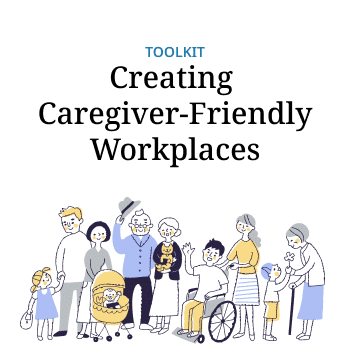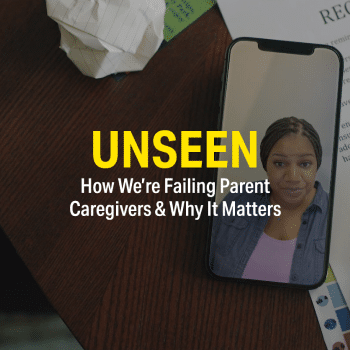
Explore the Caregiver-Friendly Workplaces Toolkit
Learn how companies with effective caregiver-friendly programs and policies can be better places to work and more profitable, too.
Creating Caregiver-Friendly Workplaces Toolkit
Presented by


Read on to discover six benefits of investing in the caregivers in your workforce.

Supported employees can worry less about losing their jobs and focus more on their work. Entire teams will be more productive by improving the productivity of just one of its members. According to research by the Harvard Business School, employers can double their investment in caregiver benefits in flextime and remote working alone, because they reduce the absenteeism and productivity loss that occurs when employee caregivers try to achieve balance without support.

Employees who are not stressed about jeopardizing their job because of their caregiving responsibilities will have less instances of stress-related mental and physical health problems, resulting in employees who feel better and have lower overall claims. In fact, employee caregivers spend 8% more on healthcare claims than their non-caregiving co-workers due to a higher risk of heart disease, obesity and stroke. Even non-caregiving employees will benefit due to the improved morale and energy among their caregiver team members.
In the 2020 Caregiving in the U.S. Research Report, conducted by AARP and the National Alliance for Caregiving, 53% of employee caregivers say they have to go in late, leave early or take time off to provide care. With an accommodating schedule, caregiving employees are less likely to take personal time unexpectedly and cause upheaval on their team.

Caregiving-friendly workplaces can better attract talented employees and reduce turnover among employees forced to choose between their job and their caregiving responsibilities. According to the National Alliance for Caregiving and AARP, 39% of caregivers leave their job to have more time to care for a loved one, with about a third of those leaving because their work does not provide flexible hours. According to Homethrive, 54.5% of employee caregivers said they would consider leaving their current employer for one that offers a caregiving support benefit.

In a 2022 Homethrive survey conducted by an independent third party, 64% of respondents believe their employer should offer caregiver support benefits, and 85% would take advantage if they did. However, only 33% of survey respondents say their companies offer such a benefit, opening a competitive opportunity for companies willing to become caregiver-friendly workplaces.

For companies that track and report DEI actions as part of their Environmental, Social and Governance (ESG) strategy, having benefits designed for caregivers can enhance your corporate responsibility profile and help you meet your ESG goals.
Here are three ways you can get started:

Learn how companies with effective caregiver-friendly programs and policies can be better places to work and more profitable, too.

The “Unseen” documentary gives an unfiltered, honest glimpse into the lives of caregivers and their families.

Whether caring for a loved one due to age, disability, or a medical condition, our intuitive online platform provides personalized advice and expert assistance, however and whenever it’s needed. We help caregivers discover a better way forward that prioritizes their loved one’s care and their own wellbeing, so they can thrive at home and at work.

Sign up to get notified about upcoming screenings, new bonus content releases, and get a 10% off coupon for our mech store!